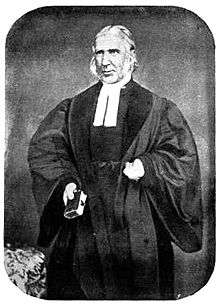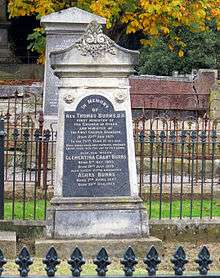Thomas Burns (minister, born 1796)
Thomas Burns (1796 – 23 January 1871)[1] was a prominent early European settler and religious leader of the province of Otago, New Zealand.
Thomas Burns | |
|---|---|
 | |
| Born | Missing required parameter 1=month! 1796 |
| Died | 23 January 1871 Dunedin, New Zealand |
| Occupation | Minister |
Early life
Burns was baptised at Mauchline, Ayrshire, Scotland in April 1796, the son of estate manager Gilbert Burns, who was the brother of the poet Robert Burns. In his childhood Thomas attended Haddington Grammar School and then the University of Edinburgh, where he studied theology. In 1826, he was ordained as minister of the parish of Ballantrae, and in 1830 married Clementina Grant, the daughter of an episcopal minister in Edinburgh. The couple lived in Monkton, where Clementina's uncle had been Presbyterian minister.[2]
Move to Dunedin
At the age of 47, Burns joined the Free Church secession from the Church of Scotland. The proposal for a Free Church settlement in New Zealand gained Burns's interest, and he was offered the position of minister of the New Edinburgh scheme (later the Otago scheme) in June 1843. Burns and William Cargill established a lay association to promote the settlement in May 1845.[2]
On 27 November 1847, Burns and 239 settlers sailed on the Philip Laing from Greenock, among them his wife, five daughters, and one son, Arthur John Burns. They arrived at the new settlement of Dunedin on 15 April 1848. He knew farming skills from his childhood and upbringing, and established a farm at Andersons Bay on Otago Harbour, which he named Grants Brae, after a house in which his father had lived in Ayrshire.[3]

He was a strict but practical man in the early days of the new settlement. A firm and devout churchman, Burns created a strong Presbyterian church as a cornerstone of the new settlement. He presided over the setting up of the Synod of Otago and Southland in 1866, and established the presbyteries of Dunedin, Clutha and Southland. A strong supporter of education, he helped establish both Otago Boys' High School and Otago Girls' High School during the 1860s, and was on the founding committee of the University of Otago,[4][5] of which he was first Chancellor from 1869 until his death on 23 January 1871.
Death
He is buried in Dunedin Southern Cemetery. His wife Clementina survived him by seven years.[2]
References
- Reed, A. H. (1956) Early Dunedin. Wellington: A.H. & A.W. Reed.
- Brooking, Tom. "Burns, Thomas". Dictionary of New Zealand Biography. Ministry for Culture and Heritage. Retrieved 19 April 2014.
- West, Jonathan (Jonathan Lewis) (March 2018). The face of nature : an environmental history of the Otago Peninsula. Dunedin, New Zealand. p. 168. ISBN 978-1927322383. OCLC 994517936.
- King, Michael (2003). Penguin History of New Zealand. p. 209. ISBN 0-14-301867-1.
- Morrell, W.P. (1969) The University of Otago: A centennial history. Dunedin: University of Otago Press, pp 6-10.